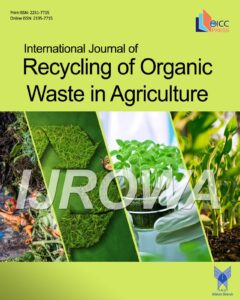A review of vegetable waste bio-processing techniques in rural areas
Authors
Abstract
Purpose: Vegetable waste (VW) could cause environmental problems if not properly managed. Due to rural living conditions and a relatively low residence density, VW is usually disposed of in landfills. Waste management should be engineered in a way to process the waste into value-added products in a sustainable manner. This review evaluates four bioprocessing techniques for this purpose: anaerobic digestion (AD), vermicomposting (VC), black soldier fly composting (BSFC), and composting.
Method: A systematic search involved databases from Scopus using keywords like “vegetable waste; anaerobic digestion; composting; vermicomposting; black soldier fly”. By reviewing and synthesizing 173 articles (with 162 from 2019–2023), this paper summarizes and illustrates the information collected.
Results: In a systematic search, AD and composting easily surpassed 2000 publications (from 2013 to January 2023). Besides composting emerged as a cost-effective (for MYR 1.40/kg) bio-processing technique in terms of production cost. This review on VW composting is based on an acceptable C/N ratio (30–50), moisture content (50%–80%), ratio of VW to additives (typically 30:70), efficient additives, and inoculation strategy. This review also summarizes the maturity index and illustrates the usage of compost and leachate as fertilizer.
Conclusion: VW composting in rural areas is reliable and beneficial because it uses a small-scale reactor and has the potential for a circular economy in the community.
Highlights
- The current state of vegetable waste composting has opportunities for improvement.
- Economic feasibility between bio-processing techniques such as anaerobic digestion, black soldier fly composting, vermicomposting, and composting is analyzed.
- Composting efficiency is improved by parameter optimization.
- The compost and leachate produced demonstrate secondary usage and initiate the circular economy.
- The environmental impact and benefits of rural vegetable waste management are discussed.





